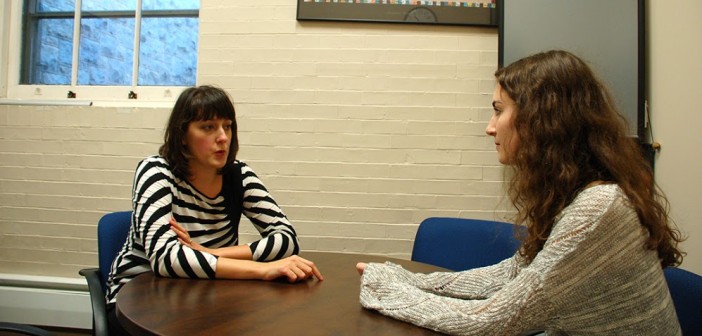Financial concerns, academic time constraints and future success are just a few of the issues a student must consider when it comes studying abroad.
According to Noel Panebianco, a study abroad counselor, a large percentage of every graduating class studies abroad. Forty percent of the 2014 graduate class went abroad and around 20 percent went more than once.
The Study Abroad Office believes that every student should go abroad at least once, so why aren’t 100 percent of Lehigh students choosing to study in a foreign country at some point during their college career?
Some students are reporting challenges when they begin the process of deciding where to go. The main issue is that students say they receive false information from their peers, Lehigh’s Study Abroad Office and other Lehigh professors. Other students are unsure if it is even possible for them to go for reasons including internship searches and their major. Many of these students do not get an opportunity to explore their possibilities with study abroad counselors because of these misconceptions.
“I think that the biggest barriers are the ones that students put on themselves or the false information that they get from campus saying that abroad isn’t really necessary,” Panebianco said.
Some students agree that there are misconceptions and identify a variety of factors that contribute.
Lehigh’s Study Abroad Office aims to provide resources that accommodate students in several of these situations.
‘I felt pressure to fulfill my major requirements’
The many academic opportunities at Lehigh require dedication to excel. Because of this, some students remain on campus in order to focus on their studies.
Kimberly Goldberg, ’15, regretted her decision to stay at Lehigh and focus on her accounting major. Echoing Panebianco’s sentiments on false information, Goldberg said that her peers influenced her decision.
“I felt pressure to fulfill my major requirements,” Goldberg said. “In the end, I guess it was possible, but many people discouraged me…Some of my older friends who were accounting majors went abroad and regretted it because of the severe course load senior year.”
Panebianco said that academics are not an excuse when a student has the opportunity to go abroad any time of the year. She said engineering students usually have an open window during the fall of their junior year, as long as they plan early.
Justin Minder, ’15, is a chemical engineering major who did not make an appointment to meet with a counselor about his possibilities.
“I know it would’ve set me back in my core classes,” Minder said. “It’s also not Lehigh’s culture to go abroad during your junior fall, so I wouldn’t have wanted to be the only one of my friends leaving.”
As Panebianco said, the issue lies within outside factors, like peers and faculty, who voice their opinions early on. These students agreed that they were influenced before they had an opportunity to consider their options.
The men stay back
There is a trend among many college campuses that fewer men go abroad than women. The Open Doors Report on International Educational Exchange published an annual report that showed in 2013, 64.8 percent of U.S. students who studied abroad were female and 35.2 percent were male.
Lehigh is no exception to this trend. According to the Study Abroad Office, 50 percent more women at Lehigh go abroad than men.
Panebianco said the office has no specific research to explain this phenomenon. She questioned if it has something to do with traditional gender roles and men focusing on their summer internships and potential jobs. She also said she believes women have these goals too, but that this may be a potential explanation.
Cedric Osborne, ’15, went abroad during a summer to Shanghai and also for a semester to Stroudsburg, France. He is aware of the negative implications that are associated with college men studying abroad.
“I had one other guy friend at Lehigh study abroad,” Osborne said. “I feel like a lot of them couldn’t go because of their class load.”
He also said that money has a lot to do with barriers to studying abroad, as students have to pay Lehigh tuition, which is usually significantly more expensive than the host tuition. Expenses also include housing, spending money and other traveling costs.
Osborne said in his Stroudsburg program of 40 people, only three, including him, were men. He said that some men don’t want to step out of their comfort zones.
“I think that many guys, especially in Greek life, are afraid to put themselves out there,” Osborne said. “You’re no longer the big man on campus, but instead a global individual.”
Course approval across the ocean
While studying abroad in South Africa last March, Andrea Wroble, ’15, was preparing to leave for her spring break vacation in Zimbabwe when she received an email from Lehigh’s Study Abroad Office that drove her into a panic.
Lehigh’s Study Abroad Office notified Wroble midway through her semester abroad that they had not received her course approval forms. She was halfway across the world with limited Internet access and had to begin the tedious process of getting her courses approved all over again.
She began searching through the extensive Lehigh course catalog to find the Lehigh equivalents of her current courses at the University of Cape Town and emailed the department heads to see if they would sign off on approval in order to receive transfer credits. In order to get accepted to the University of Cape Town, Wroble had to have submitted pre-approved transferrable credits.
“I don’t know what happened while I was abroad, but somewhere along the lines, the Study Abroad Office lost my paperwork,” Wroble said. “The Study Abroad Office was not accommodating in re-locating my forms, they were not accommodating in helping me re-do the forms or finding courses at Lehigh that were equivalent to the courses I was taking in South Africa, and they were very unhelpful throughout the entire process.”
Lehigh’s registrar finally reached out to Wroble and told her not to worry about anything until she failed or passed her abroad classes. She was never notified again and realized on her own through a degree audit request that she had received full credit from her courses. Wroble said she had completed that work all over again for nothing.
Setting yourself up for success
Another major reason some students miss out on the chance to live in another country is the pressure of landing a domestic internship for the upcoming summer.
Lori Kennedy, director of career services, is a supporter of students studying abroad in order to expand their network and brand.
“It’s difficult for students to search for internships while they’re abroad,” Kennedy said. “Students will describe it as taking another class. They have to prepare a resume, network with people, identify potential internships, apply to them and then prepare for interviews.”
Kennedy said that it is especially hard to do all of this work when a student is on a different continent, in a different time zone and, often times, with limited Internet.
Minder agrees with Kennedy and said this was another reason that influenced his decision to stay back.
“I needed to be present second semester junior year because that’s when I was applying for jobs in my field,” Minder said. “I knew a lot was riding on my junior year internship because it was possible I could get a job offer from it, which I did.”
Both Panebianco and Kennedy said students don’t necessarily need an internship the summer before their senior year. Although this concept is non-traditional, they said students who participate in internships abroad would be even more desirable to employers in the U.S.
Osborne worked in internships in both Stroudsburg and Shanghai.
“It was a challenge to communicate, but it taught me so much,” Osborne said. “It put me at a different level than the other applicants when applying to my most recent (domestic) internship because it showed I have a global perspective.”
The Study Abroad Office is working hard to correct these misconceptions. One new method the office is trying is putting their getting started information sessions available online in order to reach all students, especially the one’s with demanding schedules who may not be able attend the sessions at four o’clock in Hawk’s Nest.
“When you can go at any time of the year, there’s a time for you somewhere,” Panebianco said.






Comment policy
Comments posted to The Brown and White website are reviewed by a moderator before being approved. Incendiary speech or harassing language, including comments targeted at individuals, may be deemed unacceptable and not published. Spam and other soliciting will also be declined.
The Brown and White also reserves the right to not publish entirely anonymous comments.